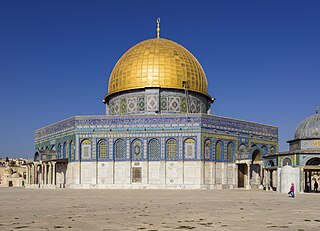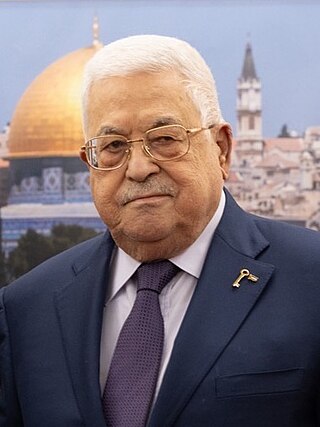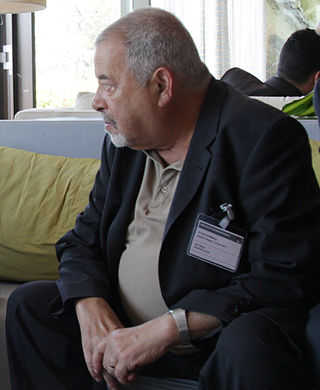
Fatah, formerly the Palestinian National Liberation Movement, is a Palestinian nationalist and social democratic political party. It is the largest faction of the confederated multi-party Palestine Liberation Organization (PLO) and the second-largest party in the Palestinian Legislative Council (PLC). Mahmoud Abbas, the President of the Palestinian Authority, is the chairman of Fatah.

The Palestinian National Authority, commonly known as the Palestinian Authority and officially the State of Palestine, is the Fatah-controlled government body that exercises partial civil control over West Bank areas "A" and "B" as a consequence of the 1993–1995 Oslo Accords. The Palestinian Authority controlled the Gaza Strip prior to the Palestinian elections of 2006 and the subsequent Gaza conflict between the Fatah and Hamas parties, when it lost control to Hamas; the PA continues to claim the Gaza Strip, although Hamas exercises de facto control. Since January 2013, the Palestinian Authority has used the name "State of Palestine" on official documents, although the United Nations continues to recognize the Palestinian Liberation Organization (PLO) as the "representative of the Palestinian people".

The Palestine Liberation Organization is a Palestinian nationalist coalition that is internationally recognized as the official representative of the Palestinian people. Founded in 1964, it initially sought to establish an Arab state over the entire territory of the former Mandatory Palestine, advocating the elimination of the State of Israel. However, in 1993, the PLO recognized Israeli sovereignty with the Oslo I Accord, and now only seeks Arab statehood in the Palestinian territories that have been militarily occupied by Israel since the 1967 Arab–Israeli War.

The history of the State of Palestine describes the creation and evolution of the State of Palestine in the West Bank and Gaza Strip.

Mahmoud Abbas, also known by the kunya Abu Mazen, is the president of the State of Palestine and the Palestinian National Authority (PNA). He has been the chairman of the Palestine Liberation Organization (PLO) since 2004, PNA president since January 2005, and State of Palestine president since May 2005. Abbas is also a member of the Fatah party and was elected chairman in 2009.

The Palestinian government is the government of the Palestinian Authority or State of Palestine. The Executive Committee of the Palestine Liberation Organization (EC) is the highest executive body of the Palestine Liberation Organization and acts as the government. Since June 2007, there have been two separate administrations in Palestine, one in the West Bank and the other in the Gaza Strip. The government on the West Bank was generally recognised as the Palestinian Authority Government. On the other hand, the government in the Gaza Strip claimed to be the legitimate government of the Palestinian Authority. Until June 2014, when the Palestinian Unity Government was formed, the government in the West Bank was the Fatah-dominated Palestinian government of 2013. In the Gaza Strip, the government was the Hamas government of 2012. Following two Fatah–Hamas Agreements in 2014, on 25 September 2014 Hamas agreed to let the PA Government resume control over the Gaza Strip and its border crossings with Egypt and Israel, but that agreement had broken down by June 2015, after President Abbas said the PA government was unable to operate in the Gaza Strip.
Hani al Hassan, also known as Abu Tariq and Abu-l-Hasan, was a leader of the Fatah organization in Germany and member of the Palestinian Authority Cabinet and the Palestinian National Council.

The Prisoners' Document, officially the National Conciliation Document of the Prisoners was written in May 2006 by Palestinian prisoners, who were being held in an Israeli jail. The five prisoners who took part in writing the Document were respectively affiliated with Fatah, Hamas, Islamic Jihad, the Popular Front for the Liberation of Palestine (PFLP), and the Democratic Front for the Liberation of Palestine (DFLP).

The Islamic Republic of Iran officially recognises Palestine as a state. Ali Khamenei, the Supreme Leader of Iran, rejects a two-state solution and implies that Palestine is inseparable, while Iran's former President Mahmoud Ahmadinejad called for a free referendum for the entire Palestinian population, including Arab citizens of Israel, to determine the type of government in the future Palestinian State, while reiterating that establishment of a Palestinian State alongside Israel would "never mean an endorsement of the Israeli occupation".

The bilateral relations between the State of Palestine and Russia have a complex history, deeply interwoven with Russian and Soviet relations with the Israeli enterprise, Palestinian nationalism, and Third World national liberation movements. Between 1956 and 1990, Soviet-Palestinian relations were part of the then ongoing Soviet-American confrontation.

Legislative elections were held in the Palestinian territories on 25 January 2006 in order to elect the second Palestinian Legislative Council (PLC), the legislature of the Palestinian National Authority (PNA). The result was a victory for Hamas, contesting under the list name of Change and Reform, which received 44.45% of the vote and won 74 of the 132 seats, whilst the ruling Fatah received 41.43% of the vote and won 45 seats.

The Palestinian Legislative Council (PLC) is the unicameral legislature of the Palestinian Authority, elected by the Palestinian residents of the Palestinian territories of the West Bank and Gaza Strip. It currently comprises 132 members, elected from 16 electoral districts of the Palestinian Authority. The PLC has a quorum requirement of two-thirds, and since 2006 Hamas and Hamas-affiliated members have held 74 of the 132 seats in the PLC. The PLC's activities were suspended in 2007 and remained so as of November 2023, while PLC committees continue working at a low rate and parliamentary panel discussions are still occurring.

Ilan Halevi Arabic: إيلان هاليفي; Hebrew: אִילָן הַלֵּוִי; born Georges Alain Albert in France; 12 October 1943 – 10 July 2013) was a French-Israeli Jewish pro-Palestinian journalist and politician, and one of the very few high-ranking Jewish members of the Palestine Liberation Organization (PLO). He was a member of the Palestinian delegation in the 1991–93 negotiations in Madrid and Washington, and was Assistant Deputy Minister for Foreign Affairs in the Palestinian Government.

The Battle of Gaza was a military conflict between Fatah and Hamas that took place in the Gaza Strip from 10 to 15 June 2007. It was a prominent event in the Fatah–Hamas conflict, centered on the struggle for power after Fatah lost the 2006 Palestinian legislative election. The battle resulted in the dissolution of the unity government and the de facto division of the Palestinian territories into two entities: the West Bank governed by the Palestinian National Authority (PNA), and the Gaza Strip governed by Hamas. Hamas fighters took control of the Gaza Strip, while Fatah officials were either taken as prisoners, executed, or expelled. The Palestinian Centre for Human Rights reported that at least 161 people were killed and more than 700 were wounded during the fighting.
Dr. Sufian Abu Zaida, also spelled Sufyan Abu Zayda, is a senior Palestinian leader, a member of Fatah and the PLO, and a former Minister of Prisoner Affairs at the Palestinian Authority. From February, 2005 until the establishment of the Hamas government, Abu Zayda served in the government of the Palestinian Authority as Minister of Prisoners and ex-Prisoners' Affairs and Minister of Civil Affairs. As Deputy Minister of the Ministry of Civil Affairs (1999–2004), his responsibilities focused on coordination with the Israeli government regarding all the civil aspects of the agreements, especially the movement of Palestinians, international crossing points and coordination between Palestinian ministries and their Israeli counterparts. Among many other activities, he has been active in the Israeli-Palestinian Geneva Initiative, in which "moderates" from both sides argue that it is possible to find a just two-state solution. Dr. Abu Zaida is also an academic scholar and lecturer at several Palestinian and International Universities and the Director of the Masters programs at Al-Quds University.

A series of attempts to resolve the hostility between Fatah and Hamas have been made since their 2006–2007 conflict and Hamas' subsequent takeover of the Gaza Strip.

The Palestinian Unity Government of June 2014 was a national unity government of the Palestinian National Authority under Palestinian President Mahmoud Abbas formed on 2 June 2014 following the Fatah-Hamas Reconciliation Agreement that had been signed on 23 April 2014. The ministers were nominally independent, but overwhelmingly seen as loyal to President Abbas and his Fatah movement or to smaller leftist factions, none of whom were believed to have close ties to Hamas. However, the Unity Government was not approved by the Legislative Council, leading to its legitimacy being questioned. The Unity Government dissolved on 17 June 2015 after President Abbas said it was unable to operate in the Gaza Strip.
The Palestinian Cairo Declaration was a declaration signed on 19 March 2005 by twelve Palestinian factions, including Fatah, Hamas, Islamic Jihad, Popular Front for the Liberation of Palestine (PFLP) and Democratic Front for the Liberation of Palestine (DFLP). The Cairo Declaration reaffirmed the status of the Palestine Liberation Organization (PLO) as the sole legitimate representative of the Palestinian people through the participation in it of all forces and factions according to democratic principles. The Declaration implied a reform of the PLO by the inclusion in the PLO of Hamas and Islamic Jihad.

Jordan–Palestine relations are strong, historical, but sometimes unstable, bilateral relations.













